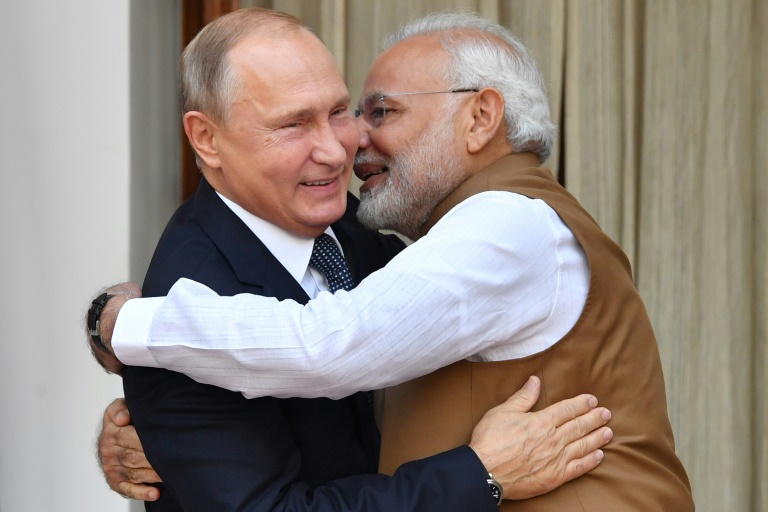Prime Minister Narendra Modi was scheduled to hold talks with President Vladimir Putin Tuesday, a day after the Indian leader arrived in Moscow, amid global outcry over Russian strikes in Ukraine.
Modi, visiting Moscow for the first time since Russia launched its campaign in Ukraine in February 2022, will seek to nurture India’s long-standing ties with Moscow.
At the same time, he is seeking closer security ties with Western countries after being returned to power last month as leader of the world’s most populous country.
“There are no surprises in the preparations. The main thing is to create an atmosphere conducive to meaningful interaction,” Kremlin spokesman Dmitry Peskov told state television when asked about the talks.
Modi landed in Moscow hours after Russia launched a massive bombing raid on several cities in Ukraine on Monday, killing more than three dozen people and severely damaging a children’s hospital in kyiv, drawing condemnation from governments in Europe and North America.
Russia is a key supplier of cheap oil and arms to India, but Moscow’s isolation from the West and growing ties with Beijing have impacted its partnership with New Delhi.
In recent years, Western powers have also cultivated closer ties with India to protect themselves from China and its growing influence in the Asia-Pacific region, while pressuring New Delhi to distance itself from Russia.
The United States on Monday urged Modi to make clear in his talks with Putin that “any resolution to the conflict in Ukraine must… be one that respects the Charter of the United Nations with respect to the territorial integrity of Ukraine.”
Modi’s last visit to Russia was in 2019 and he hosted Putin in the Indian capital two years later, weeks before Russia launched its offensive against Ukraine.
India has since largely avoided explicitly condemning Russia and has abstained from United Nations resolutions targeting the Kremlin.
– Arms, oil and China –
But the conflict between Russia and Ukraine has also had a human cost for India.
New Delhi announced in February that it was pressuring Moscow to return several of its citizens who had signed up for “support jobs” with the Russian military, following reports that some of them had been killed after being forced to fight in Ukraine.
Moscow’s relations with China are also a source of concern.
Washington and the EU accuse China of selling components and equipment that have bolstered Russia’s military industry, allegations Beijing denies.
China and India remain intense rivals competing for strategic influence in South Asia.
India is also part of the Quad grouping along with the US, Japan and Australia that is positioning itself against China’s growing boldness in Asia.
New Delhi and Russia have enjoyed close ties since the Cold War, which saw the Kremlin become a key arms supplier to the country.
But Ukraine has depleted Russia’s arms stockpiles, prompting India to seek other sources of arms supplies, including by developing its own defense industry.
Russia’s share of Indian arms imports has declined significantly in recent years, according to the Stockholm International Peace Research Institute.
At the same time, India has emerged as a major buyer of Russian crude, providing a much-needed export market for Russia after being abandoned by traditional buyers in Europe.
This has radically reconfigured their economic ties, with India saving billions of dollars while bolstering Moscow’s war coffers.
India’s monthly imports of Russian crude “rose eight percent in May, reaching the highest levels since July 2023,” according to commodity tracking data compiled by the Center for Energy and Clean Air Research.
But it has also led to a widening of India’s trade deficit with Russia, which stood at just over $57 billion in the last financial year.
From Russia, Modi will travel to Vienna for the first visit to the Austrian capital by an Indian leader since Indira Gandhi in 1983.
strawberry/ach/mca


